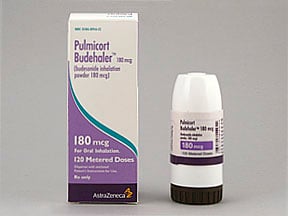
Pulmicort Flexhaler Coupons & Savings Card – Discount Prices from $255.66
My prescription
Edit
180MCG/ACT, Pulmicort Flexhaler (1 Aerosol Powder Breath Activated)
Select pharmacy

CVS
$286.41
COUPON PRICE
Walmart
$255.66
COUPON PRICE
Walgreens
$266.65
COUPON PRICE
Albertsons
$267.48
COUPON PRICEPulmicort Flexhaler savings card
Show this card to your pharmacist
Walmart
$255.66
BIN
ID
PCN
GRP
019876
LHC0ADB74D
CHIPPO
LHX
Powered by
Price history for Pulmicort Flexhaler
1 Aerosol Powder Breath Activated, 180MCG/ACT
Average retail price for Pulmicort Flexhaler
Average SaveHealth price for Pulmicort Flexhaler
Our price history data is based on aggregated prescription data collected from participating pharmacies in America. Our prescription data updates daily to reflect the latest price changes. If you notice a missing data point, it means there wasn't sufficient data available to generate a monetary value for that date.
*Retail prices are based on pharmacy claims data, and may not be accurate when we don't have enough claims.
Pulmicort Flexhaler dosage forms
Dosage Quantity Price from Per unit 90MCG/ACT 1 Aerosol Powder Breath Activated $186.12 $186.12 180MCG/ACT 1 Aerosol Powder Breath Activated $255.66 $255.66
| Dosage | Quantity | Price from | Per unit |
|---|---|---|---|
| 90MCG/ACT | 1 Aerosol Powder Breath Activated | $186.12 | $186.12 |
| 180MCG/ACT | 1 Aerosol Powder Breath Activated | $255.66 | $255.66 |
What does the Pulmicort Flexhaler do?
The Pulmicort Flexhaler is an inhalation device that delivers budesonide, a corticosteroid medication. It is used to help control and prevent asthma symptoms by reducing inflammation in the airways, making it easier to breathe. It is typically used as a maintenance treatment and is not intended for immediate relief of acute asthma attacks.
Is Pulmicort the same as albuterol?
Pulmicort and albuterol are not the same. Pulmicort contains budesonide, which is a corticosteroid used to reduce inflammation in the airways, often for long-term management of asthma. Albuterol, on the other hand, is a bronchodilator that provides quick relief by relaxing the muscles of the airways, commonly used for acute asthma symptoms or attacks.
Why is there a Pulmicort shortage?
There is a Pulmicort shortage due to increased demand, manufacturing delays, and supply chain disruptions. These factors have contributed to limited availability in some areas. It is advisable for patients to consult with their healthcare provider for alternative treatment options if they are affected by the shortage.
Is Pulmicort as good as Flovent?
Pulmicort and Flovent are both inhaled corticosteroids used to manage asthma by reducing inflammation in the airways. The effectiveness of each medication can vary depending on the individual's specific condition and response to treatment. Both medications are considered effective for controlling asthma symptoms, but the choice between them should be based on a healthcare provider's assessment of the patient's needs, potential side effects, and personal response to the medication. It is important for patients to follow their healthcare provider's recommendations and report any concerns or side effects they experience.
What does Pulmicort do for sinuses?
Pulmicort, which contains the active ingredient budesonide, is a corticosteroid that helps reduce inflammation. While it is primarily used for managing asthma by inhalation, it can also be used off-label in nasal form to help reduce inflammation in the nasal passages and sinuses. This can alleviate symptoms such as nasal congestion and sinus pressure associated with conditions like allergic rhinitis or sinusitis. However, it is important for individuals to consult with a healthcare provider to determine the appropriate use and form of budesonide for their specific condition.
